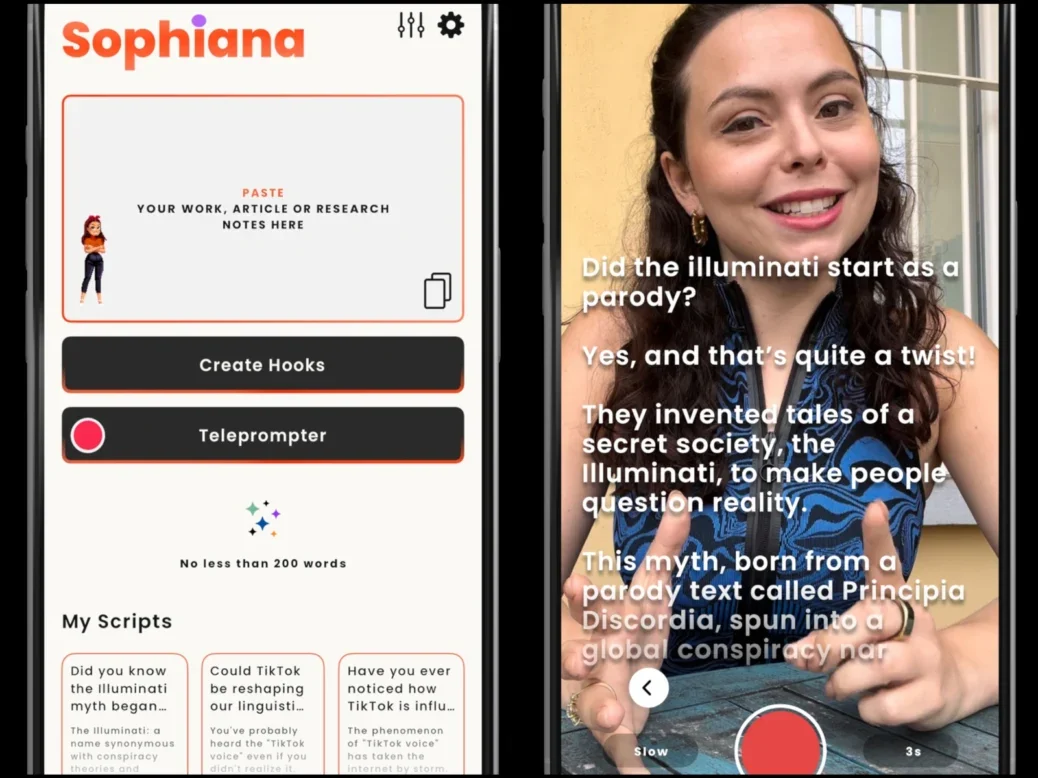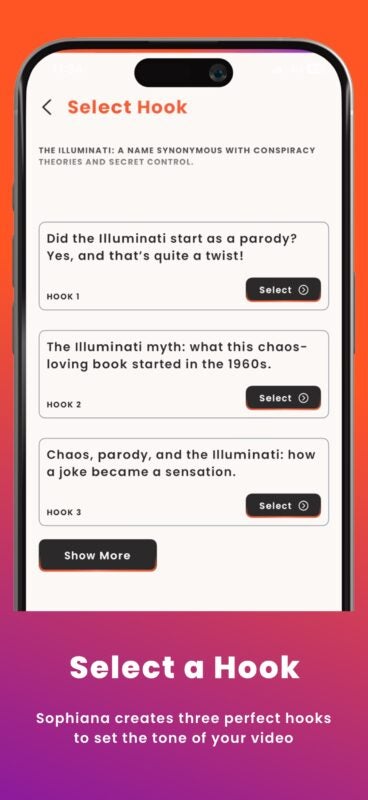
Former British Journalism Award innovation winner Sophia Smith Galer has launched an AI app aiming to help journalists get more traction with their videos on social media.
Freelance journalist and digital consultant Smith Galer, who previously worked for BBC News and Vice and was one of the first UK journalists to make waves on Tiktok, has created Sophiana to, she says, halve the time it takes to create “algorithm-ready” videos.
Sophiana allows journalists and other content creators to plug in their articles, research or notes so the app can suggest several potential hooks and then a script that it thinks will be amplified by the algorithms and engage audiences on platforms including Tiktok, Instagram Reels, Youtube Shorts and Linkedin.
Sophiana then has a teleprompter function to help people film their videos.
Smith Galer told Press Gazette she is picturing two main groups of users for the app. “I know its use case within journalism is huge – journalists really need a tool like this, and obviously it’s where I came from so I would love it for journalists who want to amplify their work on Tiktok and Instagram but have struggled so far.
“I hope that this is the headstart and the skills acquisition they’ve been waiting for that they’ve probably not been given by their newsroom, or maybe they’re freelance.
“But beyond journalists, I’ve spent a lot of time consulting lots of people who aren’t journalists, but who have factual information that they want to share, high-quality storytelling that they want to do on platforms. It’s anyone with expertise really, which is obviously a huge possible customer base.”
‘It’s time for journalists’ Instagram and Tiktok followings to flourish’
Smith Galer noted that the latest Reuters Institute Digital News Report published last week revealed the proportion consuming social video for news has risen across 48 international markets from 52% in 2020 to 65% this year. The report noted that publishers have “struggled to adapt journalistic content in a more informal space”.
Smith Galer said: “What I’ve always observed is, yes, there are news publishers – many and most in fact now – who create some kind of video products for Tiktok and Instagram, but they’re not necessarily countering or actually meeting audience needs, which we know crave influencers, personalities, and you can’t do that when you’re a brand publishing content.
“The only people who can make content that meets those needs are individuals, which is exactly why Twitter followings of journalists flourished once upon a time, and I believe it’s now time for journalists’ Instagram and Tiktok followings to also flourish. It’s just that this shift from text to visual storytelling can be hard for a lot of people.”
She added: “The rise of social videos as a news source is not going to stop. It’s just going to get bigger and bigger, and at the same time online influencers are essentially dominating this storytelling digital space where we should be dominating.
“I don’t think anyone is better at digital storytelling and preserving ethics while we do so than journalists are in theory, so this is not digital territory we should ever have ceded.”
She said she surveyed more than 100 journalists she was training about two years ago asking them why they don’t currently make Tiktok videos. “It’s not because they don’t want to, it’s because they either feel like they don’t have the time or they don’t have the skills, and that’s where I feel like AI assistance and a tool can really deal with that because it will slice production time.”
The current version of the app, which has been made through Smith Galer’s digital consultancy Viralect, uses ChatGPT-4o and a core prompt she formulated based on her knowledge creating popular videos. A later version will have her own previous video scripts plugged in to improve the output further.

Smith Galer won the Innovation of the Year prize at the British Journalism Awards 2021 for her pioneering work on Tikotk, which the judges described as “consistently engaging and witty whilst always rigorously fact-based and fresh. Their range, reach and impact have been thoroughly impressive.”
The two priorities for the next phase of development are: launching on Android as it is currently only available on the Apple App Store, and adding non-English languages with Smith Galer targeting Spanish, Arabic and French first.
“So much of my journalism and what people know me for is my love of languages. And obviously I don’t only want this to be a tool that serves English speakers, but it costs money in development time to add new language versions… and I’m missing out a huge market worldwide if I don’t go on Android.”
The app is free to download and try out and then costs £5.99 for a month, £29.99 for six months or £49.99 for a year.
Smith Galer is also inviting newsrooms and other companies to get in touch if they want an in-house Sophiana that could have additional functions such as adding watermarks to videos or incorporating their style guide.
Smith Galer injected some of her own cash but also received two sources of funding last year.
She won the Georgina Henry Award for Digital Innovation run by Women in Journalism, receiving £4,000 in prize money. It was praised because “not only does it explore the commercial benefits of AI – this eponymous innovation is also dedicated to combating disinformation”.
She also took part in a “design sprint” to develop the product with the International Centre for Journalists, securing $15,000 (£11,200) after pitching for funding at the end of it.
In recognition of the Women in Journalism support, Smith Galer is offering free Sophiana access for six months to ten female journalists in the UK who want to tackle misinformation on video, along with other training and resources from her.
Email pged@pressgazette.co.uk to point out mistakes, provide story tips or send in a letter for publication on our "Letters Page" blog

